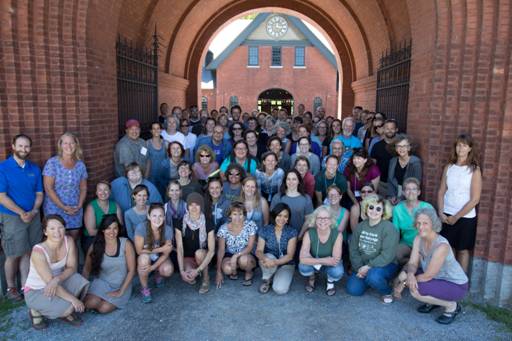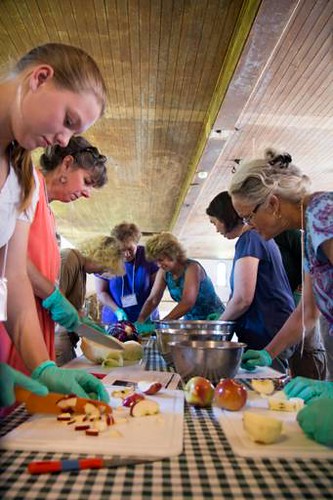
This account was written by VT FEED Project Director, Betsy Rosenbluth and Shelburne Farms Public Relations and Marketing Director, Vera Chang.
As principal of Sharon Elementary School in Sharon, Vt., Barrett Williams helps his teachers integrate farm to school pedagogy into curricula by making sure they have planning time during the school day and a stipend to compensate their efforts. Time and resources are limited for teachers who are under rigorous demands to meet school standards. So Williams must be creative to ensure food, farming, nutrition, and place-based learning are part of students’ education. We’re listening to Williams and his peers talk at a round-table workshop that is part of the pioneering, year-long Northeast Farm to School Institute. Williams is one of 90 school administrators, teachers, food service professionals, and community members at the Institute’s kick-off, held on Shelburne Farms’ 1,400-acre campus in northern Vermont.
We, VT FEED – the Vermont-based farm to school project of NOFA-VT and Shelburne Farms (agricultural and educational nonprofits) – are proud to be the organizers of this first-of-its-kind program. Thanks to the collaborative achievements of past institutes and a $100,000 USDA Farm to School Grant, we expanded our program this year beyond Vermont. We hosted 12 school teams from across New England and New York, making the 2015 Northeast Farm to School Institute the country’s first-ever regional farm to school program of its kind.
Since 2010, the Institute has successfully hosted and mentored 58 Vermont schools. It has fostered the development of school programs that encourage students to make healthy food choices, expand use of local products in cafeterias, create food and farm curriculum, build school gardens, and connect education and agricultural communities. Since participating in last year’s institute, Missisquoi Valley Union High School (Swanton, Vt.) obtained a license to sell their own meat, then raised 1,000 pounds of beef cattle for their cafeteria through the school’s Animal Science Program. Missisquoi students and teachers also started to grow their own vegetables, and they host school-wide taste tests to incorporate new farm-focused dishes into their lunch program.
Last year Missisquoi sent a team to participate for the first time in the local foods cooking challenge, Jr Iron Chef VT. The “Thunder Chefs” made a risotto with asparagus and took home a win for successfully demonstrating mise en place: exemplary teamwork, order, and professionalism. School lunch participation has increased considerably for students and teachers alike. Missisquoi Valley Union is just one of the Institute's many success stories from teams across the state.

The Northeast Farm to School Institute kick-off proved to be an inspiring, productive three days. Highlights included local procurement workshops, healthy school snack making activities, and what we call “learning journeys” – visiting Shelburne Farms’ dairy, market garden, restaurant, cheese-making operation, and onsite bakery partner, O’Bread, to see how community and place-based learning may be integrated into farm to school curriculum.
With the support of coaches, institute teams generated farm to school action plans, which they are starting to implement now and will continue to work on throughout the school year. Institute schools are tackling a lot. They’re building greenhouses and expanding school gardens, organizing Jr. Iron Chef competitions and teams, setting up cooking carts for classrooms, operating pop-up farmers markets at schools featuring produce from local farms and school gardens, and, of course, purchasing and promoting even more local foods. There’s also Breakfast After the Bell, a food access initiative being promoted to increase student breakfast participation by offering it during (as opposed to before) the school day. And as we’ve seen from past programs, schools that graduate from the institute go on to be models for neighboring schools.
Now into the sixth month of the Northeast Farm to School Institute, we’re continuing to serve as a sounding board, offer resources, and provide coaching to participants. This year’s cohort will gather as a group again at the end of the school year, June 2016, to share progress and lessons learned. Together, we’re forging ahead to make positive changes in the classroom, cafeteria, community, and beyond.
